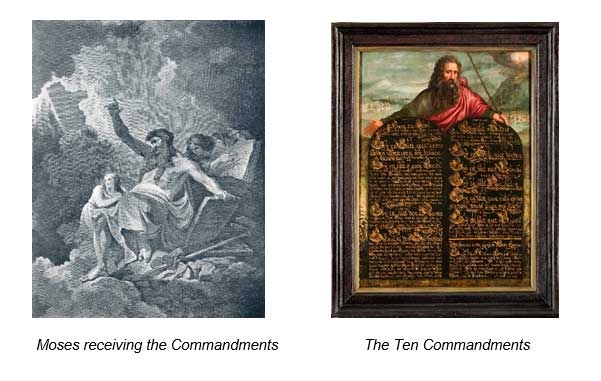LESSON 2: The Ten Commandments
Lesson 2: The Ten Commandments
Shortly after God delivered the people of Israel out of slavery in Egypt by crossing the Red Sea, they traveled through the desert to Sinai where they camped in front of Mount Sinai. It is here that God met and spoke with Moses, telling him why he had rescued Israel from Egypt. God had chosen the people of Israel to be his treasured possession. Israel would be made into a holy nation of priests for God.
One day God called Moses to the top of the mountain. He gave Moses the first part of his new system of laws for the people—the Ten Commandments. They were written by God’s own finger on tablets of stone. These commandments are written in Exodus 20 and in Deuteronomy 5:6-21. Designed to guide Israel into a life of practical holiness, the Ten Commandments offer basic rules of behavior for spiritual and moral living.

- I am the Lord your God and you shall have no other Gods before me—You should not put anything or anyone higher than God. God is the most important part of life, He is the Lord our God, and loves us so much, and we are to love him in return. (Exodus 20:3)
- You shall not make for yourself an idol in the form of anything in heaven above or on the earth beneath or in the waters below—This command forbids the use of any man-made image for the purpose of worship. No human has the ability to create a piece of artwork or construct a statue that accurately represents God. (Exodus 20:4-6)
- Don’t misuse God’s name—This command forbids mishandling, lightly using, or speaking in vain the name of God. You should not say God’s name in a mean or bad way. God’s name is special and to be worshipped and honored. (Exodus 20:7)
- Remember the Sabbath day and keep it holy—Set aside a specific day of the week to dedicate as a day of rest to the Lord—the Sabbath. God rested on the seventh day, and He wants us to rest too. It is a day to focus on God. (Exodus 20:8-11)
- Honor your mother and father so that you may live long in the land which the LORD your God is giving you—Be kind and respectful to your parents. Honoring parents will look different for every kid, but the commandment discusses that this is done to live longer. (Exodus 20:12)
- You shall not kill—You should not take someone else’s life away from them. (Exodus 20:13)
- You shall not commit adultery—God wants the promises that are made at a wedding to be kept forever. Always love our partner more. (Exodus 20:14)
- You shall not steal—You should not take what is not yours. (Exodus 20:15)
- You shall not bear false witness against your neighbor—You should not tell lies about other people; always tell the truth. (Exodus 20:16)
- You shall not covet anything that belongs to your neighbor—You should not desire someone else’s possessions, spouse, or property. (Exodus 20:17)
In general, the first three commandments are directed toward God and our obligations to him. The rest focus on our duties toward other people in the community. Together, the ten serve to create a community devoted to one God that is characterized by social justice. These commandments summarized the absolutes of spiritual and moral living that God intended for his people. The Israelites promised to obey all these commandments in front of God and so they are known as the children of the covenant.
What can we learn from the Ten Commandments?
For people who love God, the Ten Commandments serve as a guide for living in a way that demonstrates love for God and leads to a deeper experience of God’s love. They can be used as a tool for self-reflection and understanding how our actions relate to honoring God and loving our neighbor.
Questions:
- Name the prophet who received the Ten Commandments from God?
- On which mountain did Moses receive the Ten Commandments?
- Which are the Ten Commandments?
- How should one treat the name of God according to the third commandment?
- Which day is designated as the Sabbath day for rest?
- How many commandments show the relationship between God and man? Which are they?
- What is the promise made by the Israelites to God?
